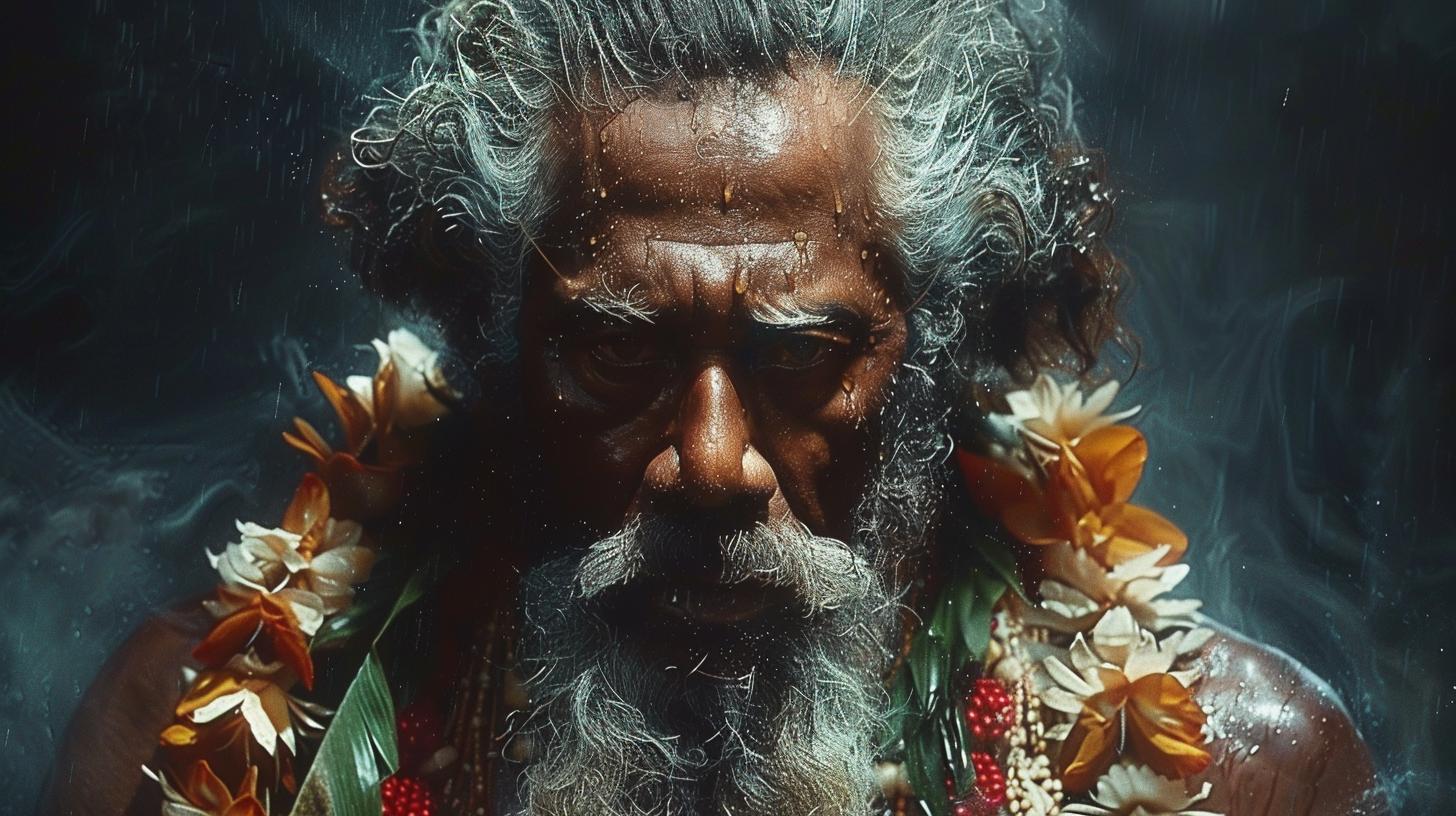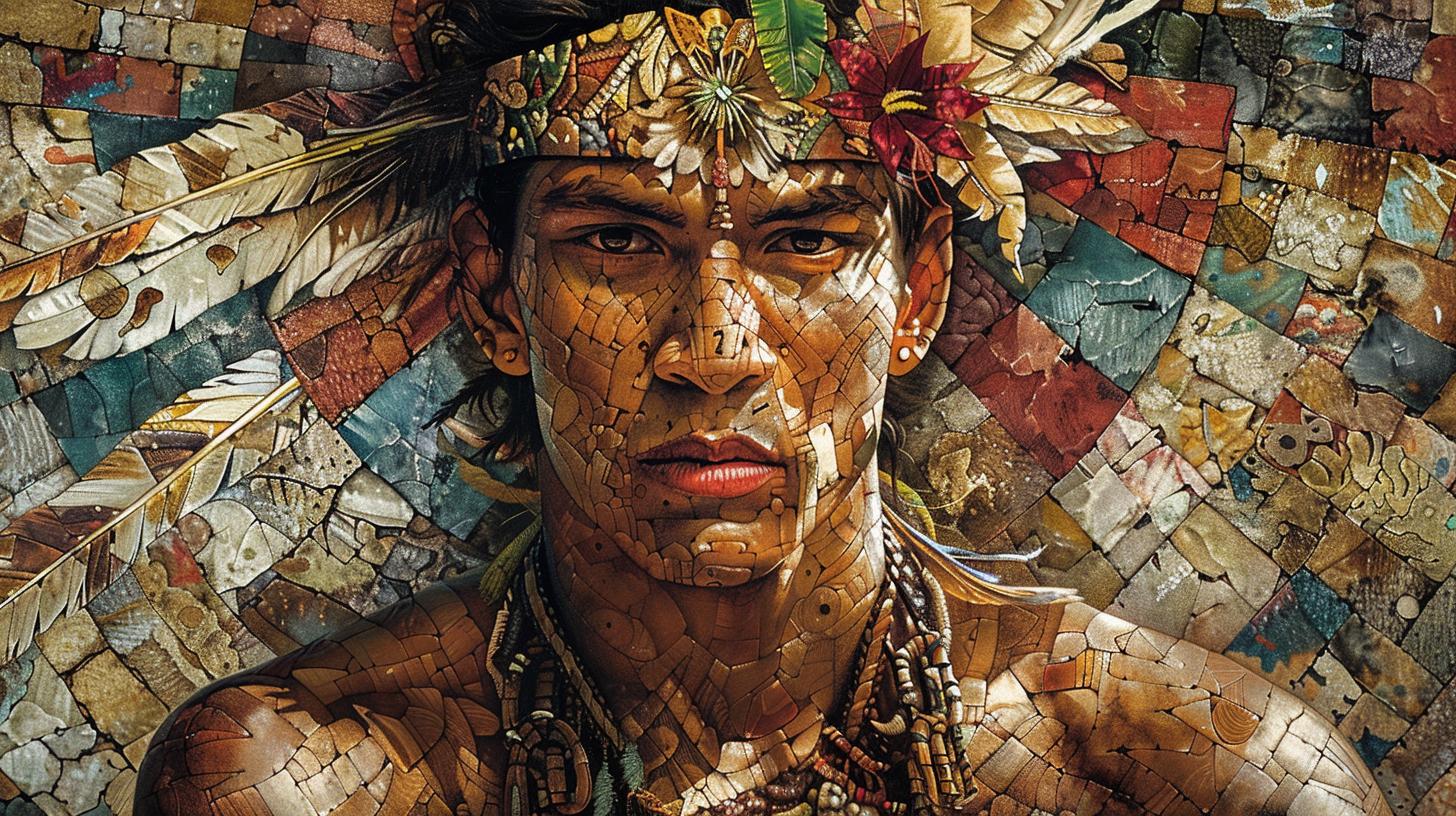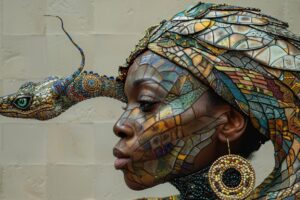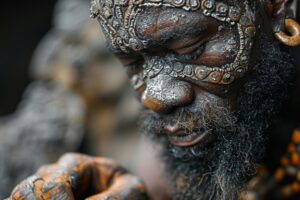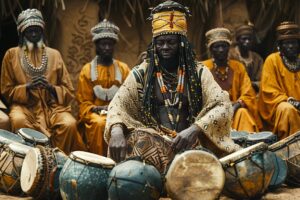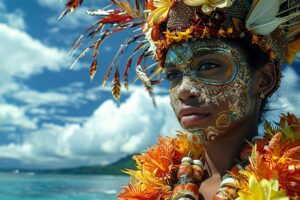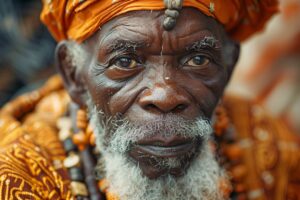Olifat Mythology: Exploring the Mysterious Legends of Micronesia
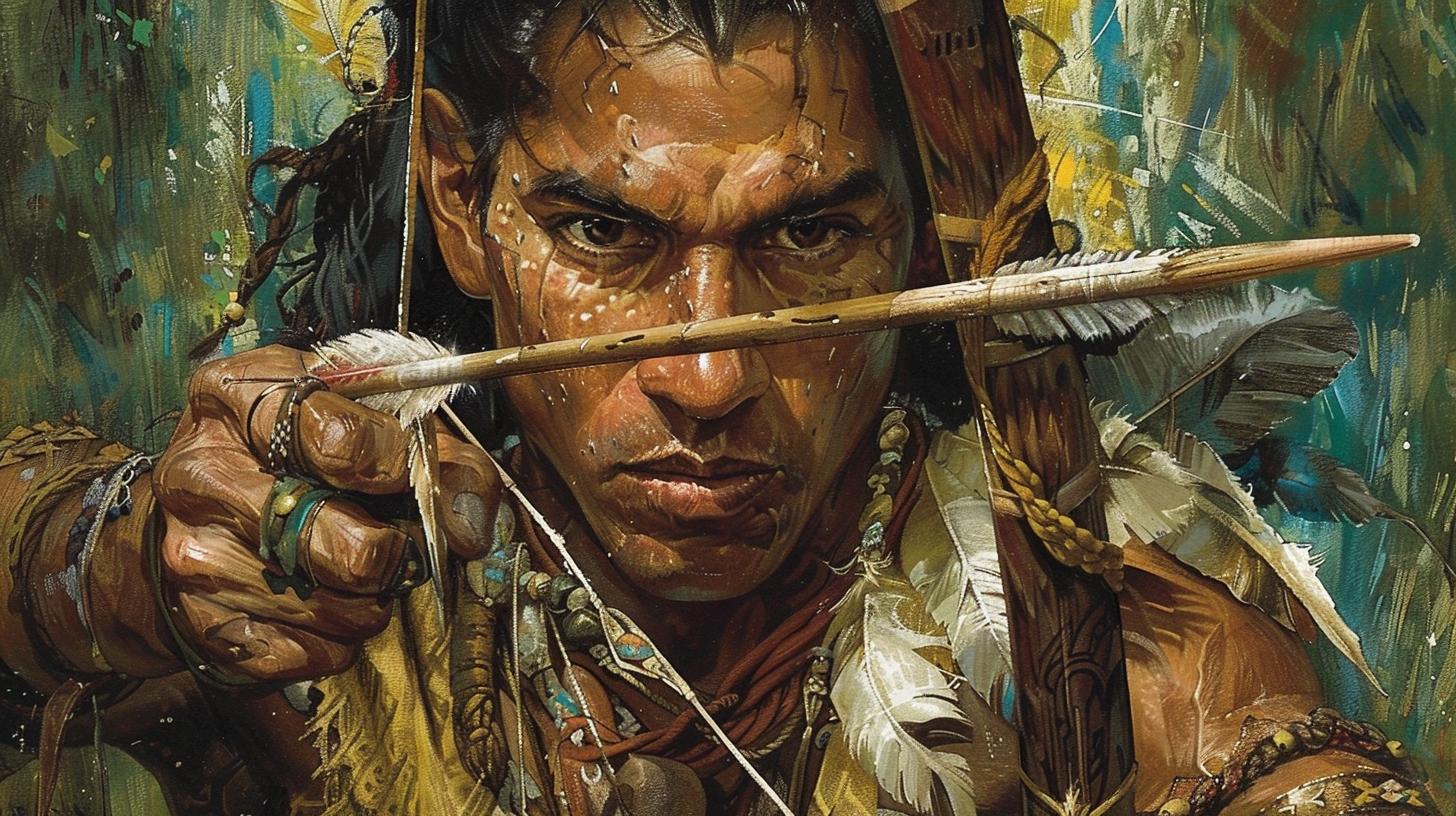
Olifat in Micronesian mythology is a mischievous deity known for causing chaos in both divine and human realms. Born from the head of his mother, he was considered unattractive and envious of his siblings.
Despite his pranks and misdeeds, Olifat is credited with bringing fire to humanity and introducing erotic tattoos in the Carolines. His complex nature embodies creativity and destruction, reflecting the duality of human existence.
The Origins of Olifat
In Micronesian mythology, Olifat’s origins are shrouded in mystery and intrigue. Born from the head of his mother, Tarisso, who was the daughter of the goddess pulpo Hit, Olifat emerged into the world as a unique and unconventional deity.
His birth was a paradoxical event, as he was both unattractive and envious of his siblings. This set the stage for the complex and unpredictable nature that would define him throughout his existence.
Olifat’s Family and Birth
Olifat, the mischievous deity in Micronesian mythology, is said to be the son of the god Lugeilan and Tarisso, the daughter of the goddess pulpo Hit. Legend has it that Olifat was born from his mother’s head, a less-than-attractive sight that triggered feelings of jealousy towards his siblings.
- Olifat was born to the god Lugeilan and Tarisso, daughter of the goddess pulpo Hit.
- Olifat’s birth was said to be from his mother’s head, a peculiar start to his existence.
- His unattractive appearance and envy of his siblings set the stage for his tumultuous life.
Olifat’s Appearance and Jealousy
Olifat, born from the head of his mother, Tarisso, was considered unattractive in appearance.
His jealousy towards his siblings fueled his mischievous nature and penchant for causing chaos and trouble in both divine and human realms.
Olifat’s Pranks and Misdeeds
Throughout his life, Olifat engaged in numerous tricks and malicious actions that caused chaos and discontent among both gods and humans. Examples of his pranks include giving sharks sharp teeth, causing termite infestations, and creating issues with sour wine.
These mischievous deeds often led to conflict and turmoil, showcasing Olifat’s penchant for creating trouble.
- Creating infestations of termites
- Cursing wine to turn sour
- Providing sharks with sharp teeth
Despite his destructive actions, Olifat’s pranks were not always intended to harm, but rather to cause mischief and stir things up.
His disruptive behavior added an element of unpredictability to the world, keeping both gods and humans on their toes.
Olifat’s Contributions to Humanity
Olifat is credited with bestowing fire upon humanity, a gift that revolutionized daily living and provided warmth and protection. This significant contribution fundamentally changed the way humans interacted with their environment, enhancing their ability to cook food, stay warm, and ward off predators.
- Introducing
- Revolutionizing
- Enhancing human
In addition, Olifat is said to have brought forth the practice of erotic and magical tattoos in certain regions of the Carolinas, adding a unique cultural aspect to the inhabitants.
These intricate designs were believed to hold mystical powers, influencing personal relationships, health, and protection.
- Bringing forth
- Creating intricate designs
- Influencing personal relationships
Olifat as a Trickster Deity
In the myths of Micronesia, Olifat is portrayed as a mischievous trickster deity who delights in causing chaos and confusion. His pranks and antics often lead to unexpected consequences, both for the gods and for humans.
- Olifat’s love for playing tricks knows no bounds, and he is known for his clever schemes and elaborate hoaxes.
- Despite his chaotic nature, Olifat’s antics sometimes serve a greater purpose, challenging the order of the world and pushing boundaries.
- As a trickster figure, Olifat embodies the unpredictable and whimsical side of the divine, keeping both gods and mortals on their toes.
- His mischievous nature adds a sense of unpredictability to the myths, showing that even in the realm of gods, trickery and mischief play a significant role.
Olifat’s Dual Nature
Olifat’s character in Micronesian mythology is characterized by his dual nature, embodying both creative and destructive tendencies.
His actions and behaviors often oscillate between these two extremes, showcasing a complex and multifaceted personality.
- Olifat’s creative side is evident in his contributions to humanity, such as bringing fire to mankind and introducing unique tattoo traditions in the Carolines.
These acts demonstrate his innovative spirit and willingness to empower and inspire.
- On the other hand, Olifat’s destructive nature is seen in his penchant for pranks and misdeeds that disrupt order and cause chaos.
His erratic behavior and unpredictable actions add an element of danger and unpredictability to his character.
- As a trickster deity, Olifat straddles the line between benefactor and malefactor, blurring the boundaries between good and evil.
This ambiguity contributes to his allure and enigmatic persona, keeping both gods and humans on edge.
Olifat as a Promethean Figure
Olifat, in the myths of Micronesia, embodies traits similar to the Titan Prometheus of Greek mythology. Like Prometheus who brought fire to humanity, Olifat is credited with introducing fire to the people, symbolizing both a gift and a source of chaos.
This act of sharing fire showcases Olifat’s role as a benefactor who brings knowledge and power to humans, despite the potential risks involved.
- Olifat’s gift of fire represents a pivotal moment in Micronesian mythology, marking his status as a figure who bridges the gap between gods and mortals.
- While Prometheus faced consequences for his actions, Olifat’s dispersion of fire brings both positive and negative outcomes, reflecting the dual nature of his character.
- Just as Prometheus faced the wrath of Zeus, Olifat’s actions often lead to conflict and challenges, highlighting the complexities of being a revered yet controversial figure in mythology.
Olifat’s Role in Micronesian Mythology
Olifat plays a significant role in Micronesian mythology, being known for his mischievous and chaotic nature.
Despite his destructive tendencies, he is credited with bringing fire to humanity and introducing erotic tattoos in the Carolines.
Olifat is considered a trickster deity, capable of extraordinary feats, although his intentions are not always benevolent.
Described as a seductive figure, he can assist men in reuniting with their partners.
Olifat’s Seducing Abilities
Olifat is renowned for his irresistible charm and seductive prowess, capable of captivating even the most steadfast individuals. His allure transcends physical attraction, delving into the realm of enchantment and allure.
With a mere glance, Olifat can weave a web of desire, ensnaring hearts and minds alike.
- His seducing abilities are legendary, whispered in hushed tones among the people of Micronesia.
- Olifat’s power to entice knows no bounds, drawing admirers and devotees to his side effortlessly.
- Those who fall under his spell often find themselves willing participants in his whimsical adventures and daring escapades.
While his seduction can lead to unpredictable outcomes, there is an undeniable allure to Olifat’s enigmatic persona.
His ability to sway emotions and manipulate desires is a testament to his deceptive charm and enigmatic allure.
Olifat’s Chaotic Nature
Olifat is characterized by a chaotic nature, often stirring up trouble and mischief among both gods and humans. His actions are unpredictable and his pranks can have unforeseen consequences.
- He delights in causing chaos and confusion, reveling in the disorder he creates.
- Olifat’s penchant for mischief can lead to disruptions in the harmony of the divine and mortal realms.
- His chaotic nature brings a sense of unpredictability and instability to the world around him.
This chaotic side of Olifat’s personality adds an element of uncertainty to the myths and legends surrounding him, keeping those who encounter him on their toes.
Olifat’s Impact on Those Around Him
Olifat’s chaotic nature extends beyond his own actions, affecting those in his vicinity. His unpredictable behavior often brings troubles and challenges to anyone who crosses his path. Individuals who encounter Olifat may find themselves entangled in his schemes, facing unforeseen consequences and disruptions in their lives.
- Those influenced by Olifat may experience sudden changes in their circumstances, as he has a tendency to shake things up and create turmoil wherever he goes.
- Friends and foes alike are equally susceptible to Olifat’s whims, as he shows no favoritism in spreading his mischievous influence.
- Communities impacted by Olifat’s presence may need to adapt quickly to navigate the chaos he brings, finding ways to mitigate the disruptions caused by his tricks and pranks.
Olifat’s Creativity and Destructiveness
Olifat, within Micronesian mythology, embodies a unique combination of creativity and destructiveness.
His actions range from bringing fire to humanity to introducing erotic tattoos, showcasing a blend of innovation and chaos.
- His innovative nature led him to bring vital elements, such as fire, to the human realm.
- Despite these beneficial contributions, Olifat also engaged in destructive behaviors, causing problems and chaos with his mischievous deeds.
- His dualistic character is evident in his ability to create and destroy, exemplifying the intricate balance between construction and havoc in mythical narratives.
Olifat’s legend weaves a complex tapestry of creativity and destruction, underscoring the intricate dynamics of divine figures within Micronesian folklore.
Olifat’s Mysterious Legends
Olifat’s enigmatic nature is shrouded in a tapestry of mysterious tales passed down through generations in Micronesia. These legends paint a vivid picture of a deity whose actions and motivations remain elusive, captivating the imagination of those who hear of his deeds.
- The Whispering Winds: Some tales speak of Olifat’s ability to communicate with the wind, whispering secrets and riddles that only the breeze can carry. Rumors swirl of lost messages and hidden truths, forever dancing in the air.
- The Haunted Shadows: In the cover of night, Olifat’s shadow is said to take on a life of its own, creeping and slithering in ways that defy reason.
Many believe that encountering this shadow brings both fortune and misfortune, depending on how it is received.
- The Phantom Laughter: Laughter echoes through the night, eerie and ethereal, signaling Olifat’s presence nearby.
Some claim that hearing his laughter brings luck, while others warn of impending chaos and mischief.
Olifat’s Unconventional Actions
Olifat was known for his unconventional actions that often left those around him astounded and confused. Whether it was introducing taboo practices or defying traditional norms, Olifat’s behavior challenged the status quo.
- Creating unpredictable situations that tested the boundaries of societal conventions.
- Implementing radical changes that stirred controversy among both gods and humans.
- Engaging in bizarre rituals that showcased his disregard for conventional norms.
Olifat’s Legacy in Micronesia
Olifat’s influence extends far beyond his mischievous deeds, leaving a lasting legacy in Micronesian mythology.
Through his unconventional actions, he has shaped the stories and beliefs of the people in the region for generations. His role as a trickster deity has added a layer of complexity to the cultural understanding of divine beings in Micronesia.
- Olifat’s Creative Impact
- Olifat’s Chaotic Influence
- Olifat’s Unconventional Behavior
- Olifat’s Enduring Presence
Olifat’s Influence on Human Culture
Olifat’s enigmatic persona has left an indelible mark on the culture of Micronesia and beyond.
- In art, Olifat’s chaotic nature is often portrayed through vibrant colors and whimsical images, reflecting his trickster qualities.
- His role as a promethean figure is celebrated in storytelling and folklore, inspiring tales of daring and inventiveness.
- Olifat’s seducing abilities are symbolized in some traditional dances and rituals, showcasing his allure and charm.
Moreover, Olifat’s legacy extends to modern society, where his influence can be seen in various forms of creative expression.
Olifat: A Complex Mythological Figure
Olifat is a multifaceted deity in Micronesian mythology, embodying both creativity and destruction in his actions and behaviors. He is depicted as a trickster figure who engages in pranks and misdeeds, causing chaos and problems in both divine and human realms.
- Olifat’s seducing abilities are legendary, as he is known for assisting men in winning back their partners through cunning and charm.
- His chaotic nature often leads to unexpected consequences for those around him, showcasing his unpredictable and mischievous personality.
- Despite his negative actions, Olifat also brings valuable contributions to humanity, such as introducing fire and erotic tattoos in certain regions of the Micronesian islands.
Olifat’s duality as a promethean figure highlights his ability to perform extraordinary feats, albeit with questionable intentions at times.
His legacy in Micronesia is marked by a mix of admiration and caution, as his unconventional actions continue to intrigue and perplex scholars and storytellers alike.
.











